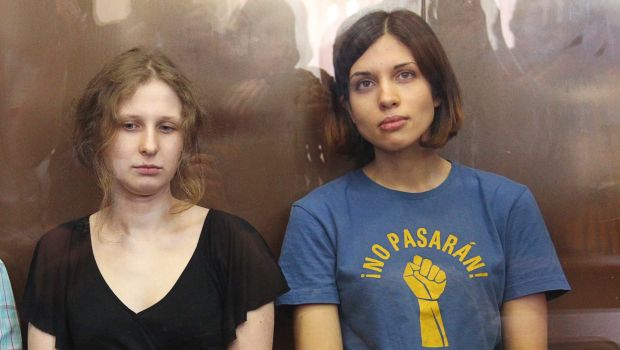
A 17 August 2012 file photo of Russian feminist punk-rock band Pussy Riot members Maria Alyokhina (left) and Nadezhda Tolokonnikova (R) sitting in a glass-walled cage in a court room at the Khamovnichesky Court in Moscow, Russia (EPA/MAXIM SHIPENKOV)
The amnesty, which also would likely free the two jailed members of the Pussy Riot punk band, has been largely viewed as the Kremlin’s attempt to soothe criticism of Russia’s human rights records ahead of the Winter Olympics in Sochi next year. But opposition lawmakers argued it doesn’t go nearly far enough and the complicated legislation appeared to leave many questions open.
The State Duma on Wednesday voted 446-0 in favor of the carefully tailored bill, which mostly applies to those who haven’t committed violent crimes, first-time offenders, minors and women with small children. Lawmakers said they expect about 2,000 people to be released from jail.
The Duma adopted last-minute amendments to the bill to include suspects of hooliganism who are still awaiting trial, a provision that could apply to the crew of a Greenpeace ship facing those charges after their September’s protest in the Arctic.
The activists, who spent two months in jail before they were granted bail, were initially accused of piracy but authorities later changed that charge to hooliganism.
The nation’s top investigative agency has said, however, that the probe into the incident isn’t over yet and that some of the crew members could face additional charges, such as assaulting a law enforcement official, so it has remained unclear whether the Greenpeace crew would be pardoned.
Greenpeace said it hopes that the amnesty bill will allow foreign crew members of the Arctic ship to get exit visas and leave Russia.
“The Arctic 30 now hope they can spend Christmas at home,” said Greenpeace spokesman Aaron Gray-Block. “But it is too early to say.”
The crew members insist the charges against them were bogus.
“I might soon be going home to my family, but I should never have been charged and jailed in the first place,” the ship’s captain Peter Willcox said in a statement.
The bill is also expected to release Nadezhda Tolokonnikova and Maria Alekhina, the jailed members of the Pussy Riot punk band who are serving two years in prison on charges of hooliganism for an irreverent anti-Kremlin protest at Moscow’s main cathedral. They both have small children.
However, the legislation doesn’t contain names, and there has been no official confirmation that Tolokonnikova and Alekhina could be released.
The amnesty does not cover former oil tycoon Mikhail Khodorkovsky, who has been widely described as Russia’s top political prisoner, and only eight out of 26 defendants who took part in a 2012 protest rally on the Bolotnaya square in Moscow that ended in scuffles between protesters and riot police.
Opposition lawmaker Dmitry Gudkov said the amnesty bill “has buried all hopes of human rights activists and families of political prisoners that their children and family members will be set free.”
The amnesty will go into effect as soon as the bill is published in the government newspaper, which is expected to happen on Thursday. But it allows authorities a six-month period to carry it out, meaning some of the prisoners could in theory wait weeks or months before getting released. Prisoners would apply to prison administration for amnesty, and officials would decide whether they were eligible.
Those of them who committed disciplinary offenses behind bars could be denied amnesty.
Lawyers and families of the Pussy Riot members insist that everyone eligible for the release ought to be allowed to walk free as soon as the bill is published. Their prison terms end in March.
Pyotr Verzilov, Tolokonnikova’s husband, told The Associated Press he believes there is nothing to stop his wife from being released if the bill is published on Thursday.
